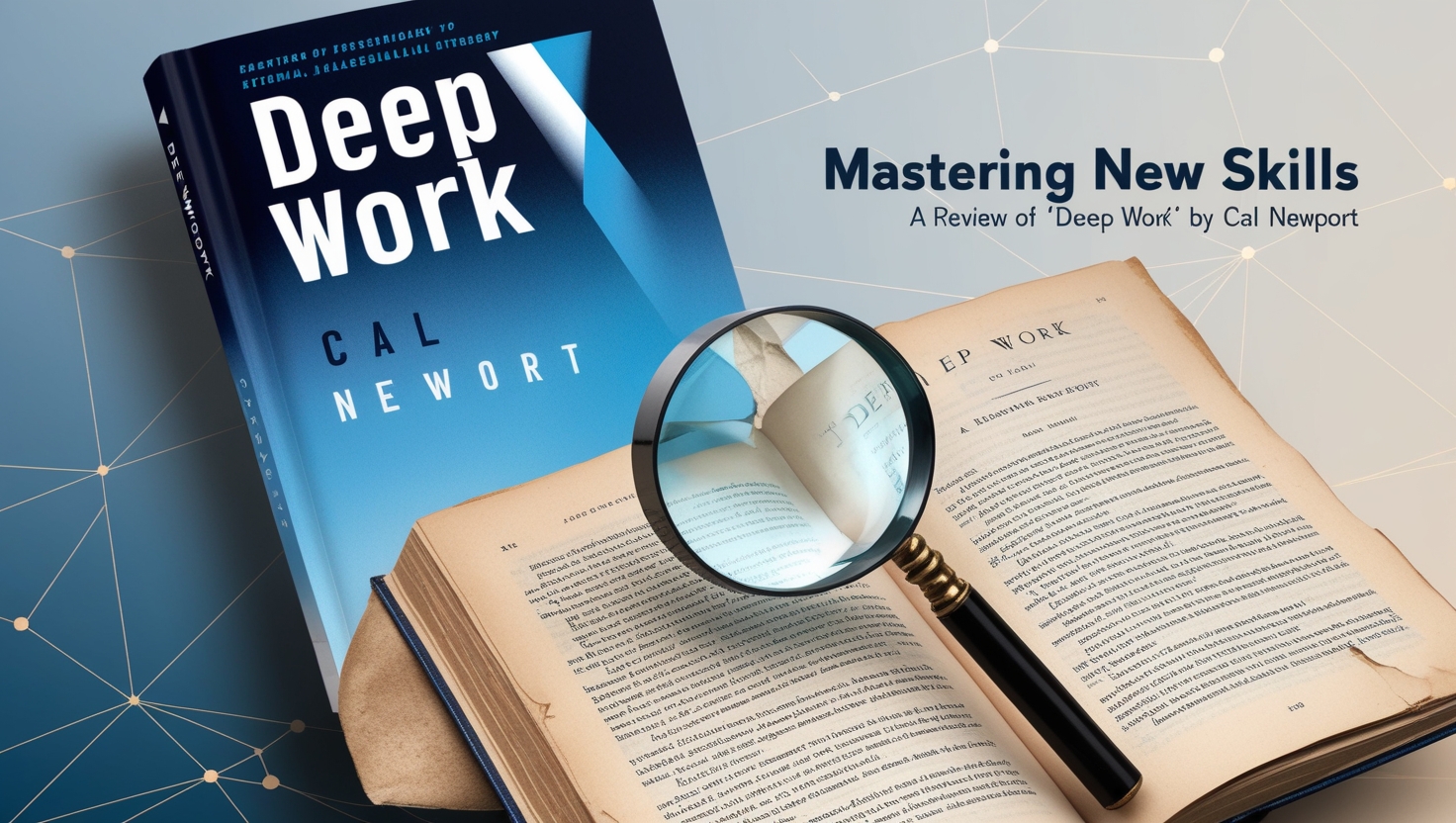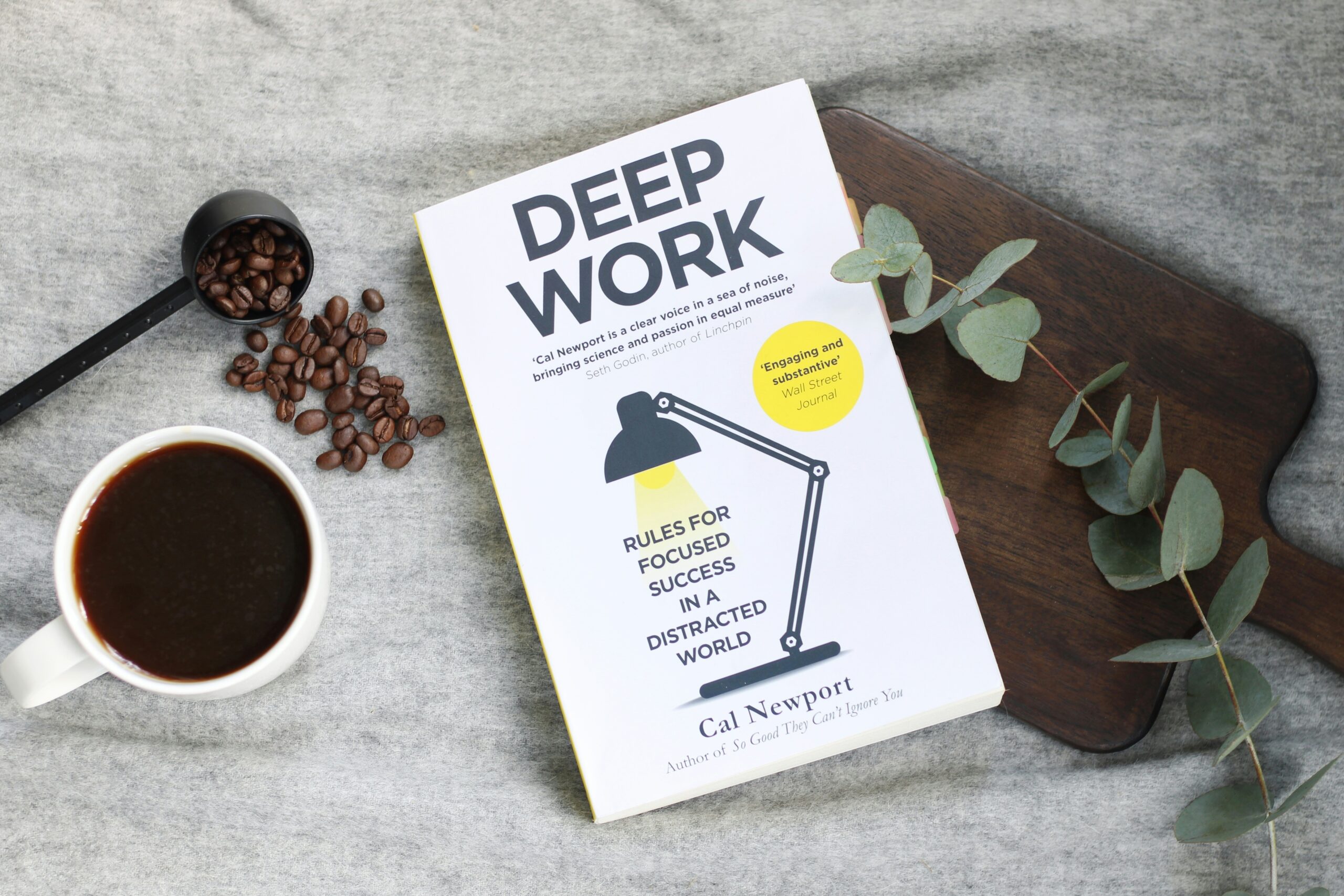Ability to deeply focus on tasks-a really unique skill in today’s fast-paced digital world, whereby there are distractions at every corner. Mastering new skills requires more than time; it demands focused intent. In his book Deep Work: Rules for Focused Success in a Distracted World, Cal Newport provides a compelling framework for the development of this important ability. This article approaches the key concepts from Newport’s work: an overview of how you can apply these principles to master new skills in your personal and professional life.
Understanding the Concept of Deep Work
Deep Work is the term used by Cal Newport to refer to professional activities performed in a state of distraction-free concentration that push cognitive capabilities to their limit. Such efforts create new value, enhance skills, and are hard to reproduce. In opposition, Newport gives the example of shallow work: tasks of logistical nature and not requiring focused mental effort, like answering emails or taking part in meetings not necessary.
Newport says that the ability to perform deep work is becoming increasingly rare, thanks to the constant distractions of modern life, but it is simultaneously becoming increasingly valuable. He bases this on the fact that the current economy obviously rewards those who can learn complex things fast and then produce high-quality work in an unrealistically short period of time. So, in such an environment, deep work needs to be mastered in order for one to thrive.
Deep Work and Its Significance When Mastering New Skills
Anything that requires learning new skills takes time and extended periods of concentrated effort. Be it learning a new language, coding, or mastering a musical instrument, the deep work principles greatly bear on the learning process. The distractions of daily life can greatly reduce the time and attention you could give to learning. Newport gives insights to help you manage to create the time and space for deep focus, hence helping to fast-track your learning.
The Neuroscience Behind Deep Work
Neuroscience proves Newport right: intense focus allows the brain to make stronger neural connections. In a process called myelination, this begets faster and easier signal transmission in the brain for better learning and acquisition of skills. Deep work not only lets one learn a skill much better, but in return, with time, it enhances one’s cognitive ability in such a manner that even more complicated activities become easier to learn later on.
The Four Rules of Deep Work
Newport summarizes the four rules in Deep Work that are to be a companion in frisking up the skills of deep work. The rules will be the ticket to instilling habits and mindsets effective for the challenging distraction-dominated world today.
1. Work Deeply
This rule stresses the importance of maximizing deep work time. To enact this, Newport suggests creating rituals for deep work; for example, working in exactly the same place at the same time every day, eliminating distractions, and setting clear goals for what you want to achieve in the session.
2. Embrace Boredom
To balance the constant stimulation, Newport suggests practicing boredom. This would involve scheduling time for downtime or intentionally doing tasks that would not challenge the mind. The concept revolves around training the brain to endure and prosper in a state of focused concentration rather than constantly flip towards distractions. Buy Now on Amazon
Buy Now on Amazon
3. Quitting Social Media
Newport challenges this status quo and asks, “Must one use social media personally and professionally?” He proposes a “30-Day Social Media Fast,” where all optional technologies are eliminated for 30 days and their impacts assessed. Any tool that doesn’t have a significant positive impact should be permanently eliminated.
4. Drain the Shallows
This rule seems to be oriented towards reducing shallow work-that is, shallow work that takes up more of the workday than it should. This rule would involve using techniques such as time-blocking, where you schedule every minute of your day in advance so that shallow work is minimized and deep work maximized.
Deep Work in Enhancing Skill Mastery
By following the rules governing deep work, you will find great change in your approach towards the learning of a new skill. You may ask yourself: what are the benefits?
1. Quicker Learning
Deep work can only be done through massively undistracted and single-minded effort. By the end of it, one would find themself able to master new skills much faster than with a shallow approach.
2. Improved Quality of Work
When one works deeply, the quality of outputs increases. This is because deep work puts you in a position to work more on the material, leading you to an investment in understanding it better, hence coming up with more creative solutions.
Deep work is the ability to focus without distraction on a cognitively demanding task. It's a skill that allows you to quickly master complicated information and produce better results in less time. Deep Work will make you better at what you do and provide the sense of true fulfillment that comes from craftsmanship. In short, deep work is like a super power in our increasingly competitive twenty-first century economy. And yet, most people have lost the ability to go deep-spending their days instead in a frantic blur of e-mail and social media, not even realizing there's a better way.
3. Sharpened Cognition
Regular sessions of deep work will, in fact, improve cognitive skills, thus allowing you to handle larger problems that you might want to tackle if you were to take up the discipline.
4. Greater Satisfaction
There is a deep sense of satisfaction from knowing that one has mastered a new skill through focused effort. In fact, this can contribute to motivating someone even more and driving them toward even greater achievement.
Challenges to Deep Work Practice
While the benefits of deep work are so crystal clear, putting these principles into practice often becomes an uphill undertaking. The modern workplaces foster shallow work. And secondly, there’s the ubiquitous nature of digital distraction, which makes finding that much time and space for deep work quite hard to achieve. But fortunately, Newport gives ways through which all these challenges can be trumped.
1. Dealing with Distractions
One of the main obstacles to deep work is how to handle distractions. According to Newport, one needs to create an environment which minimizes such distractions. This can be in the form of working in a quiet space, using noise-cancelling headphones, or setting specific times for checking emails and messages.
2. Building Discipline
This discipline in deep work takes some time and practice to build. Newport advises, “Start small-just 30 minutes a day, perhaps-and gradually increase this time as your ability to focus improves.”

3. Balancing Deep and Shallow Work
In reality, certain shallow work is unavoidable. Newport suggests scheduling shallow work for the less productive hours – like immediately after lunch, or late in the afternoon – in order to keep the hours of deepest focus free for deep work.
Real-World Applications of Deep Work
From academia to entrepreneurship, this would be across all verticals. Some practical examples of applying deep work in varied contexts could look something like the following:
1. Academic Success
Deep work for students offers them the opportunity to master many difficult subjects and ace examinations. This will be possible by building a study schedule and reducing possible distractions that would negatively impact their comprehension and retention of material.
2. Professional Development
In the workplace, deep work yields more creative solutions and higher quality outputs. A working professional who engages regularly in deep work normally turns out to be productive and gets better results on all project engagements.
3. Creative Pursuits
Deep work will surely benefit artists, writers, and musicians a lot. The undivided attention will spur their imaginations and create unique styles or techniques.
4. Entrepreneurship
Deep work is crucial in entrepreneurship for thinking strategically and solving problems. Giving time to work deeply will enable entrepreneurs to invent ideas that were not thought of earlier and solutions that help move businesses.
Conclusion: Adopt Deep Work to Master Any Skill
Deep Work by Cal Newport explains in detail and illustrates a powerful framework for the mastery of new skills among a sea of distractions. The application of deep work principles will enable you to accelerate your learning process, raise the quality of your work, and guarantee greater personal and professional satisfaction.
But it does take discipline to bring deep work into your routine. Most who’ve tried it feel that the rewards make it well worth the commitment, be it career advancement, learning a new skill, or fulfilling the urge to create.
By embracing deep work, one is not only assured of increasing productivity but also investing in one’s intellect and preparing oneself for long-term success in an increasingly competitive world. The principles outlined in Newport’s book provide some kind of guide for anyone in mastering new skills and then achieving excellence.








2 thoughts on “Mastering New Skills: A Review of ‘Deep Work’ by Cal Newport”